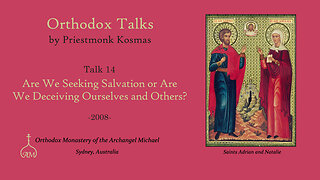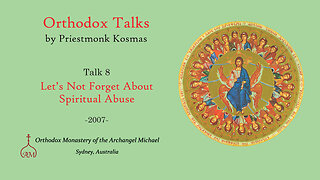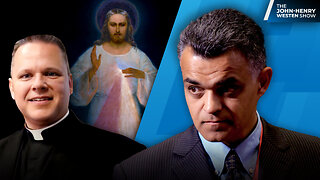Talk 48: Blessed Are the Merciful, For They Shall Obtain Mercy!
Orthodox Talks by Priestmonk Kosmas, Sydney, Australia
iTunes: https://podcasts.apple.com/us/podcast/orthodox-talks/id1659252607
Spotify: https://open.spotify.com/show/0sKZoGUhAjJua9RtjoZS73
Podcast: https://rss.com/podcasts/orthodoxtalks/
Orthodox Christians who read the Holy Bible will have read Christ’s words: “Blessed are the merciful: for they shall obtain mercy.” Regarding these words, the Holy Fathers clearly teach that at the Last Judgment only those who show mercy will obtain mercy. This is why the saints put great effort into fleeing from the soul-destroying passion of mercilessness by practising works of mercy. Hence, it is important for all who desire salvation to know exactly what works of mercy are.
In this talk, Father Kosmas uses the writings of various saints to explain how almsgiving is not the only way to be merciful. Works of mercy can be broken up into two groups: physical and spiritual. A significant part of the talk is dedicated to providing many practical examples of works of mercy. By the end of the talk we will see that, no matter what spiritual struggles we undertake, without mercy there will be no mercy.
The following questions are also discussed: why did the thief on the cross receive mercy? Why were the five foolish virgins not shown mercy? Why does God create inequality in the world? Is the desire to show mercy equal to the deed itself? Are the rich allowed to enjoy their wealth? Do Orthodox elders require Christians to tithe? Why are many supporters of Susan Boyle hypocrites?
Other points covered in this talk include: how one young man gave up his ‘freedom’ in order to show mercy; how ‘merciful’ euthanasia is actually merciless; how the attitude ‘I don’t want charity’ is from the devil; how those who give alms benefit greatly not only in the afterlife but also in this life; how some of the rich begged the poor to take their money out of mercy; and the worthlessness of prayer, fasting, confession, and communion without compassion.
-
 2:48:47
2:48:47
Orthodox Talks
1 year agoTalk 14: Are We Seeking Salvation or Are We Deceiving Ourselves and Others?
630 -
 2:01:48
2:01:48
Orthodox Talks
1 year agoTalk 08: Let’s Not Forget About Spiritual Abuse
422 -
 55:28
55:28
The John-Henry Westen Show
1 year agoGET READY: Divine Mercy Comes Right Before Divine Justice | Fr. Chris Alar
5.74K11 -
 25:22
25:22
Church Militant
1 year agoDivine Mercy: Fraud — or Faithful? | Forward Boldly
2762 -
 14:01
14:01
Sensus Fidelium
2 years ago $0.01 earnedPride: Be Merciful to Me, a Sinner
102 -
 13:44
13:44
Down to Earth But Heavenly Minded Podcast
2 years agoSound Words, Behold My Servant
14 -
 12:15
12:15
News from Jesus
1 year agoNov 28, 2015 ❤️ Jesus says... Be merciful with yourselves as you are with Others too
51 -
 5:35
5:35
Down to Earth But Heavenly Minded Podcast
2 years agoSound Words, God Shall be With You
25 -
 34:53
34:53
HandinHandwithGodTv
3 months agoMentions You @ Power To Triumph || Sin Must Be Dealt With Immediately In The Church || Mar 18, 2024.
4 -
 13:48
13:48
Down to Earth But Heavenly Minded Podcast
2 years agoSound Words, Shouldst thou help the ungodly?
8